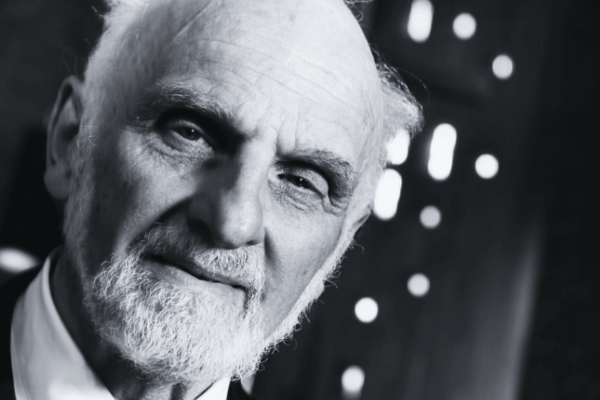Walter Brueggemann believed the future was unwritten. The biblical scholar and theologian, who died on June 5 at the age of 92, spent his remarkably prolific career urging Christians to think beyond what is and imagine what could be. That possibility, he believed, was grounded in the hope of a God who desires justice for the marginalized. Brueggemann had a humble spirit, an academic mind, and a poetic soul — but don’t be fooled: He was, above all, a radical.
He was born in rural Nebraska, a pastor’s kid who fell in love with academia early. After getting a Th.D. from Union Theological Seminary, he became a professor of Old Testament at Eden Theological Seminary outside of St. Louis, Mo. He then received a Ph.D from Saint Louis University before taking on the role of Professor of Old Testament at Columbia Theological Seminary in Decatur, Ga., where he served from 1986 until his retirement nearly two decades later. Over his career, Brueggemann gained a huge, denomination-spanning audience for his justice-forward exegesis of the Bible. He believed that Jesus was on the side of the poor, the marginalized, and the outcast, and that Christianity, taken seriously, must always exist in prophetic opposition to empire.
He did this in well-loved books like Truth Speaks to Power (2013), Sabbath as Resistance (2014), and, most famously, The Prophetic Imagination (1978), which remains an indispensable text for any justice-minded Christian. “The Prophetic Imagination gave countless mainstream white Christians permission to reconsider social justice as an integral part of their faith and practice,” activist theologian Ched Myers told Sojourners in 2018. “In it a respected member of the academic guild (and a Presbyterian) dared to breach the gulf between seminary, sanctuary, and streets—something all too rare in white professional biblical studies at the time.”
The best way to honor Brueggemann is to start reading. Pick up The Prophetic Imagination, Sabbath as Resistance, or any of the 100-plus books he wrote. As we mourn his loss and celebrate his legacy, here are a few quotes from some of those books to inspire your own reflection and motivate you towards the sort of faith Brueggemann believed all of us should aspire to: a faith that thrives in the possibility of the unwritten future.
“Compassion constitutes a radical form of criticism, for it announces that the hurt is to be taken seriously, that the hurt is not to be accepted as normal and natural but is an abnormal and unacceptable condition for humanness.” – From The Prophetic Imagination
“Hope, on one hand, is an absurdity too embarrassing to speak about, for it flies in the face of all those claims we have been told are facts. Hope is the refusal to accept the reading of reality which is the majority opinion; and one does that only at great political and existential risk. On the other hand, hope is subversive, for it limits the grandiose pretension of the present, daring to announce that the present to which we have all made commitments is now called into question.” – From The Prophetic Imagination
“That divine rest on the seventh day of creation has made clear (a) that YHWH is not a workaholic, (b) that YHWH is not anxious about the full functioning of creation, and (c) that the well-being of creation does not depend on endless work.” – From Sabbath as Resistance
“In both his teaching and his very presence, Jesus of Nazareth presented the ultimate criticism of the royal consciousness. He has, in fact, dismantled the dominant culture and nullified its claims. The way of his ultimate criticism is his decisive solidarity with marginal people and the accompanying vulnerability required by that solidarity. The only solidarity worth affirming is solidarity characterized by the same helplessness they know and experience.” — From The Prophetic Imagination
“The outcome is to delegitimize and deconstruct the kings in effective ways in order to show that while they occupy the forms of power, they lack the substance of power.” – From Truth Speaks to Power
“Since we now live in a society—and a world—that is fitfully drifting toward fascism, the breaking of silence is altogether urgent. In the institutional life of the church, moreover, the breaking of silence by the testimony of the gospel often means breaking the silence among those who have a determined stake in maintaining the status quo.” — From Interrupting Silence
“Prayer is a refusal to settle for what is.” — From Interrupting Silence
“The world does not need the church to talk about what is already possible. The work of the church is to battle the world’s definition of what is believable and unbelievable.” — From A Gospel of Hope
“So prophetic imagination is grounded in the conviction that God is doing something lively in the world. That it may be slow, but it is very sure, and that a new world is coming into being that will discredit and dismiss the old totalism.” — From “Called to a Dangerous Oddness”
“The practice of prophetic imagination requires energy, courage, and freedom and the sense of being otherwise. I have no doubt that we are now arriving at a moment when there is no more middle ground. That we either sign on uncritically to the totalism, or we take on this task of dangerous oddness that exposes the contradictions and performs the alternatives.” – From “Called to a Dangerous Oddness”
Editor's Note: An earlier version of this piece neglected to mention that Brueggemann received a Th.D. from Union Theological Seminary before receiving his Ph.D. from Saint Louis University.
Got something to say about what you're reading? We value your feedback!







